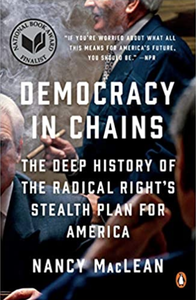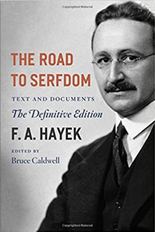Challenges to Democracy Here and Abroad
Our original focus was on the book Democracy in Chains, by Nancy MacLean, 2017. It is about the efforts of free-market economists and oligarchs to loosen restraints on the US economy and reverse many of the guarantees that most Americans take for granted, such as Social Security and public schools.
However, we spent the first half of the meeting discussing the current war by Russia against Ukraine, and the struggle between autocratic and democratic elements in the world. Is this war an inevitable result of a conflict between those elements, or is it due to the megalomaniacal fantasies of one man? Russia has no history of democracy, except for a brief period after the fall of the Soviet Union in 1991, when there was an unregulated free-for-all — a democracy in name only — under Boris Yeltsin. Oligarchs seized government assets and enriched themselves at the expense of everyone else. This gave democracy a bad name in the eyes of many Russians. Vladimir Putin, a previous KGB (Secret Police) official took over the failed democracy, and after his election in 2000, immediately instituted authoritarian measures, moving the country “back to the USSR.” He has instituted more stringent measures since that time, and has just closed the country’s last independent news outlet. Those who follow his career are aware that elections are meaningless in Russia, with opponents being harassed or jailed, as is the case in other authoritarian states that were part of the Soviet Union, such as Hungary and Poland, where there still is some semblance of democracy, but elections are rigged heavily in favor of the incumbent.¹ We discussed the authoritarian mindset of rulers who stay in power by identifying “enemies of the state” both internal and external, as did Stalin and Hitler. When information is limited — by design or choice — there seems to be a large part of the population who will back authoritarians. We now are finding out that some of the Russian soldiers committing atrocities in Ukraine may actually believe that they are eliminating Nazis. There also are those in our own country who believe that an election was stolen despite clear evidence to the contrary that was verified by judges of Republican and Democratic backgrounds. The question we might ask ourselves is: does human nature compel people to identify an enemy who we consider not quite human, that then justifies acts that we would not commit against those we consider members of our own group? According to Democracy in Chains, James Buchanan spearheaded much of the libertarian movement in the US starting around the time of the 1954 Supreme Court Brown v Board of Education decision that ordered the desegregation of schools in the South. Much of his work helped to lend legitimacy to “states rights” efforts by setting up shop in southern universities — first at U of Virginia and then at George Mason University. Eventually his work was funded by the Koch Brothers, and led to the formation of so-called libertarian “think tanks,” such as the Cato Institute and the Heritage Foundation, which have had considerable influence on American legislators and justices. The book states that, because of our expanding welfare state, libertarians consider the foundations of the US to have failed, including the Constitution. In their view no restraints on free enterprise are justified, and government must be stripped to its most basic functions such as roads, military and police, to allow Americans to experience the type of freedom they advocate. (Page xxviii) 
The main economists that promote these views are those of The Chicago School, including Friedrich Hayek and Milton Friedman. Hayek, in his 1947 book The Road to Serfdom, promoted the idea that all social planning is socialism, a view that probably comes out of his experience in Austria during the Second World War, when the two largest dictatorial powers, Germany and the Soviet Union, had the word socialism as part of their titles.² Many of Hayek’s promoters, however, seem unaware that he also advocated basic social supports — a contradiction of pure libertarian dogma. Friedman was the most famous of the free market economists, and his view was that any restraints on markets interfere with human freedoms.
The author states: “One only has to read Charles Dickens to grasp the reality of unregulated capitalism: the unchecked economic power of some enables the domination of others.” (Page 97) Taking that further, as we discussed in the group, democracy itself was the reaction to the unfettered freedom of some that impedes that of others. Economic inequality grows everywhere unless democratic guarantees are put in place. This goes back to the foundation of democracy in Athens, and began in modern times by the rebellion of thirteen colonies who believed themselves economically smothered under the British colonial system. The actual workings of a libertarian economy were on display in Chile under Pinochet, under a system that Buchanan and other libertarian economists helped to establish which was one of the world’s most unequal economies (but Chile now is in the process of revising its libertarian constitution). Corporate donors to the Koch-sponsored “Institute for Contemporary Studies,” have included Exxon, Mobil, Shell, Texaco, Ford, IBM, Chase, US Steel and General Motors. Even the relatively radical views of the conservative economists mentioned above was not adequate for Charles Koch. He referred to them as “‘sellouts to the system.’ Why? Because they sought ‘to make government work more efficiently when the true libertarian should be tearing it out at the root.’” (Page 135) To cite a few of the effects of these efforts, “In 2014, only 7 of 278 members of Congress were willing to acknowledge that man-made climate change was real. … Scott Walker’s administration (in Wisconsin) imposed a gag order in 2015 to prohibit employees … from discussing climate change. Rather than admit their ideological commitment to ending public education, Koch-based libertarians claim that the problems in today’s schools are the result of teachers’ unions having too much power.” (Page 217) This only is a part of the larger issue of whether government should be shrunk to allow unfettered freedom — whatever its result — or if it is the role of government to regulate market forces. We can hear the echo of Ronald Reagan saying that “government is the problem.” But the razor he attempted to apply to government was not even radical enough for our current libertarian pundits — the deficit actually ballooned under Reagan. Perhaps it is fair to say that democracies work best when there is a balance between the forces of freedom and regulation that protects and promotes the rights of the vulnerable, which at one time or another is most of us.
Your comments and thoughts always are welcome. Also, don’t forget to look at our blog site: renewingdemocracy.org
Please recommend this newsletter to people who you think might appreciate it. If you want to be added to the list to receive each new newsletter when posted, fill out our contact form and check the box just above the SUBMIT button. You may also use that form to be removed from our list.
Visit our Books page for information about purchasing The Future of Democracy, The Death of Democracy, and Truth & Democracy. Click ↓ (#) Comments below to view comments/questions or add yours. Click Reply below to respond to an existing comment.
0 Comments
|
 5th edition now available 5th edition now available
Steve ZolnoSteve Zolno is the author of the book The Future of Democracy and several related titles. He graduated from Shimer College with a Bachelor’s Degree in Social Sciences and holds a Master’s in Educational Psychology from Sonoma State University. He is a Management and Educational Consultant in the San Francisco Bay Area and has been conducting seminars on democracy since 2006. Archives
July 2024
Categories |
 RSS Feed
RSS Feed